The HyperTexts
For Darfur
Poems for Darfur
Prayers for Darfur
This page contains poems written for and about Darfur, and its
recent history of ethnic cleansing and genocide.
Darfur is a region in Western Sudan that has been in a state of humanitarian
emergency since 2003.
Related pages:
Gaza
Poems,
Nakba Poems,
Haiti Poems, Hiroshima
Poems, Holocaust Poems,
911 Poems,
Trail
of Tears,
Parkland Poems
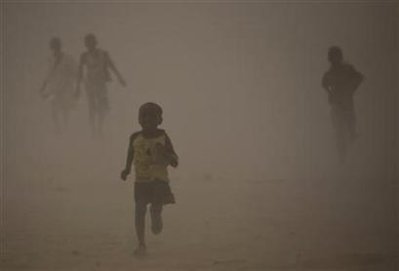
A place named Darfur swarms with death like moths.
Epitaph for a Child of Darfur
by Michael R. Burch
I lived as best I could, and then I died.
Be careful where you step: the grave is wide.
This is a page of poems about Darfur, but more importantly of poems and prayers for Darfur, by poets who stand in solidarity
with our brothers and sisters there. We are asking the people of the world to understand that when the United States acts
unilaterally, often "all hell breaks loose," so it's up to the United Nations and all the nations and peoples of the earth to
come together to help resolve the terrible problems currently afflicting Darfur. Ethnic cleansing and genocide are the world's problems:
terrible symptoms of the "heart disease" and "brain disease" that continue to plague humanity. We also challenge all the
religions of the world to denounce racism, intolerance, ethnic cleansing, genocide, slavery and all forms of inequality and violence. Surely
love, mercy and compassion are the watchwords of any true religion. Also, if you are a student, teacher, educator, peace activist or just
"someone who cares and wants to help," please read
How Can We End Ethnic Cleansing and Genocide Forever? and do what you can to make the world a safer, happier place for
children of all races and creeds.
Come Lord and Lift
by T. Merrill
Come Lord, and lift the fallen bird
Abandoned on the ground;
The soul bereft and longing so
To have the lost be found.
The heart that cries—let it but hear
Its sweet love answering,
Or out of ether one faint note
Of living comfort wring.
For the Children of Darfur, with Butterflies
by Michael R. Burch
Where does the butterfly go
when lightning rails, when thunder howls,
when hailstones scream, when winter scowls
and nights compound dark frosts with snow?
Where does the butterfly go?
Where does the rose hide its bloom
when night descends oblique and chill
beyond the capacity of moonlight to fill?
When the only relief's a banked fire's glow,
where does the butterfly go?
And where shall the spirit flee
when life is harsh, too harsh to face,
and hope is lost without a trace?
Oh, when the light of life runs low,
where does the butterfly go?
Rally for Darfur
by Rabbi J. Rolando Matalon
In the Armenian genocide it was written and in Darfur it is being sealed:
How many shall join the hundreds of thousands who have already perished,
and how many shall be born into a horrible life,
who shall live and who shall die,
In the Shoah genocide it was written and in Darfur it is being sealed:
who shall be raped and who shall be tortured,
who shall perish by sword and who by bullets,
which village shall be burned and which well shall be poisoned,
In the Cambodian genocide it was written and in Darfur it is being sealed:
who will make it to the refugee camp and who will die on the way,
who will die by hunger and who by thirst,
who by disease and who by plague,
In the Bosnian genocide it was written and in Darfur it is being sealed:
Who will have their food rations cut and who will get enough food for another day,
Whose child will die and whose will survive.
In the Rwandan genocide it was written and in Darfur it is being sealed:
who will remain silent and who will scream for action
who will be complacent and who will have moral courage
who will cave in to despair and who will be elevated by hope.
But using our voices, exercising our power and demanding action
can help save lives NOW.
Dua/Prayer for the People of Darfur, Sudan
by Imam A. Rasheid Omar
O Allah, thou art Peace and Peace emanates from thee.
Allow us to live and to subsist in Peace, O Most Merciful
of those who show Mercy.
O Compassionate One, O Companion to every lonesome one, we implore you to comfort the hearts of the people
of Darfur with your magnificence.
Lord of all Humankind, from what we have witnessed, grant us the grace to have a greater understanding and
empathy for the suffering of innocent victims of the war in the Sudan, no matter their, ethnicity, color or religion.
All-wise and All-mighty God, Grant the leaders of the Sudan wisdom and guide them to use their power to serve
the good of all and to fashion a more just and caring world.
Amin.
Dear God, in the matter of Darfur
by the Covenant Community Church in Raleigh, N.C.
Dear God,
in the matter of Darfur, help me to
be concerned without cynicism
involved without fear
speak without rancor
pray without ceasing
live without complicity
so that with my brothers and sisters in Darfur we may
live with hope
act with confidence
speak truth with strength
and become your loving presence on this earth. Amen.
A Prayer for the People of Darfur
by Rabbi Sir Jonathan Sacks
O God of peace, who commands us to seek peace, send peace to the people of Darfur.
O God of compassion, who hears the cry of the afflicted, hear the cry of the victims, the bereaved, the injured, and
all those who live their days in fear.
Rouse the hearts of the leaders of the world to put an end to the bloodshed, the violence, the rape, the starvation,
and the terror that has ravaged and endangered an entire population.
Be with those who are working for peace, or tending the sick, or bringing food to the hungry, or shelter to the
homeless, or hope to those who are close to despair.
O God of justice and love, let us not be indifferent to the cry of the persecuted and the ears of those who have
seen their homes, their families, and their communities destroyed.
And may their plea and their plight reach the ears and hearts of those who have it in their power to bring peace to
a troubled region and aid to a devastated people.
Oseh shalom bimromav—may You who makes peace in Your high places help us make peace down here on earth.
Vigil for Darfur
by Sabina Carlson
Hold up your candle if you are an angel.
Hold up your candle if the light of hope
dances and curls about your spine
like the breath of light
about the wick.
Or blow out your candle if you believe
that when
these flames flicker out
we will forget
the faces we now see before us:
the faces
of the hopeful,
and the memory of the abused.
Hold up your candle
if the people standing alongside you
have become your wings,
so that
side by side
we fly
to a better place and time.
Hold up your candle if you know that sound
does not travel
through air and wires but rather through the
chords
of our hearts and that we will never
be able to claim
that we could not hear
a single cry
because a deafening ocean
stood between us.
Hold up your candle if you remember
how the world forgot 800
thousand Rwandans,
hold up your candle if you have a hole
burnt into your heart
by the Shoah, the Great Fire,
the Holocaust
and hold up your candle if you can still see
the smoke
and taste the ashes.
Hold up your candle
if you know
that tears
only feed
that fire.
And hold up your candle
if you refuse to let the world
sob itself to sleep, waiting for a wish,
because we did not listen to them,
because we did not burn with them,
because we did not tell them
“I am
going
to save you.
Here,
I am your miracle.”
For who
dares to say that miracles are simply
the dusted spines
of Bibles?
Friends, look
at the crying wings you stand
side by side with, listen to the heavenly
psalms of hope and hurt, feel your heart
rise
through the halo above your head
to join with a hundred thousand others
who will heal
this world.
hold up your candle
if you
are an angel.
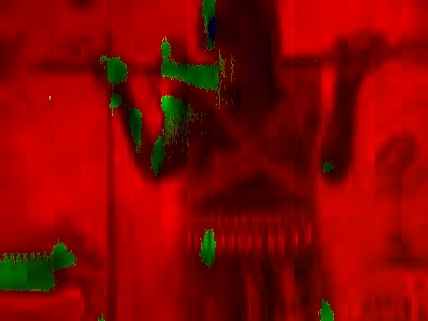
Art by Anne R. Kee
Neglect
by Michael R. Burch
What good are your tears?
They will not spare the dying their anguish.
What good is your concern
to a child sick of living, waiting to perish?
What good, the warm benevolence of tears
without action?
What help, the eloquence of prayers,
or a pleasant benediction?
Before this day is gone,
how many more will die
with bellies swollen, wasted limbs,
and eyes too parched to cry?
I fear for our souls
as I hear the faint lament
of their souls departing ...
mournful, and distant.
How pitiful our "effort,"
yet how fatal its effect.
If they died, then surely we killed them,
if only with neglect.
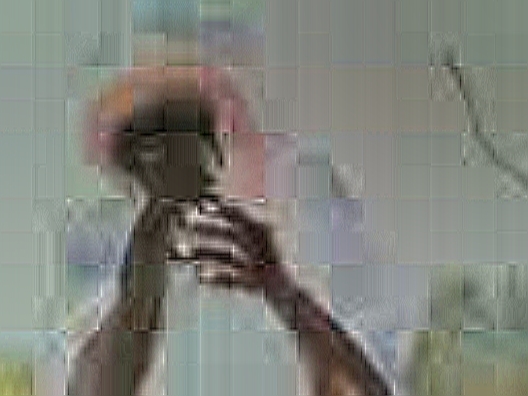
Art by Anne R. Kee
Djembe Drum Beat
by
Debbie
Amirault Camelin
He placed his brown hand over mine
stopped my rhythm-less banging
and pulled the drum away
to cradle in his legs
and caress the taunt skin
of the carved conical drum
comforting it against my assault.
I folded my hands in my lap
the proper lady thing to do
when defeat feels imminent.
I offered, "There is a rhythm in me
but it’s buried deep."
"Very deep", he assured me.
We continued the lesson
left hand gradually grasping the beat
right hand perfectly tone-deaf.
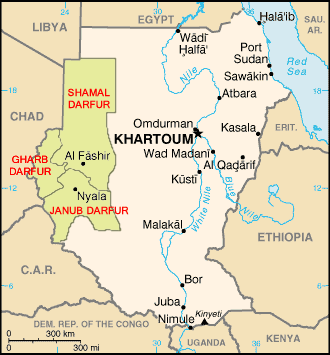
Intimidation
by
Debbie
Amirault Camelin
Intimidation by definition
can only mean separation
pits one against the other
encourages retribution
Mama Africa she lived the struggle
evaded shadow men witnessed Apartheid crumble
They confront the white policemen
demand to know why the boy
is being detained his arm wrenched
behind his back an angled decoy
He is not from here
smirks the cop
though his hand loosens its grip
there’s no intention to stop
dark ladies step forward with looks of indignation
Mama Africa heard Freedom’s song
to reconstruct the System reconcile the wrong
They contradict the boy
lives down the street ignore
inference he’s not South Africa
born their eyes underscore
resolve to cease this interrogation
Stoic they stand near the squad car
witness fear drain from the boy’s face
he cautiously grasps who the victors are
in this awkward altercation
Mama Africa weeps for her children
a vanquished generation lonely African orphan
The police concede release the boy
who upright stands a head taller
than the others rubs his reddened wrist
flexes assaulted arm adjusts his collar
distancing himself from this humiliation
As the cruiser pulls away he
bows his head in humble respect
Ngiyabonga thank you voice of refugee
in his eyes deep satisfaction
Mama Africa allied to the land
marches forever forward steadfast her stand
"Intimidation" was the winning poem in the 2006 Tom Howard Poetry Contest.
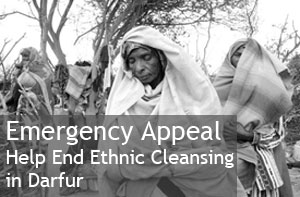
Skull Trees, South Sudan
Adrie Kusserow
Arok, hiding from the Arabs in the branches of a tree,
two weeks surviving on leaves,
legs numb, mouth dry.
When the mosquitoes swarmed
and the bodies settled limp as petals under the trees,
he shinnied down, scooping out a mud pit with his hands
sliding into it like a snake,
his whole body covered except his mouth.
Perhaps others were near him,
lying in gloves of mud, sucking bits of air through the swamp holes,
mosquitoes biting their lips,
but he dared not look.
What did he know of the rest of South Sudan,
pockmarked with bombs,
skull trees with their necklaces of bones,
packs of bony Lost Boys
roving like hyenas towards Ethiopia,
tongues, big as toads, swelling in their mouths,
the sky pouring its relentless bombs of fire. Of course they were
tempted to lie down for a moment,
under the lone tree, with its barely shade,
to rest just a little while before moving on,
the days passing slyly, hallucinations
floating like kites above them
until the blanched bones lay scattered in a
ring around the tree,
tiny ribs, skulls, hip bones—a tea set overturned,
as the hot winds whistled through them
as they would anything, really,
and the sky, finally exhausted,
moving on.
Published in
Best American Poetry 2008; originally published in The Kenyon Review
Darfur
by Dr. Amitabh Mitra
Suddenly a baby cries
Malnourished
Maltreated
And ravaged
Men woman and children
Hang by their
Skin to
Mirages
the desert burns the skull
of all reasons
Storms that sweep
Into their eyes
Locks up
Within corneas
Daring death to open them
Darfur has no word
Darfur has no meaning
Darfur has deaths
The baby squeaks
Because only
He has the pride to
Know
When the
Janjaweed
Are coming
Its time then
The mirages are
slashed open
By flashing swords and
Faceless marauders
Screams will be a welcome whirlwind
Chasing the sun again.

Darfur (Jesus Wept)
by William F. DeVault
Half a million dead in Darfur, in the Sudan.
100 times the innocents who died on 9/11.
Children. Women. Men. Genocide.
Wake up and see.
Wake up and see.
Wake up and see why
Jesus wept.
The rains didn't come
the sounds of the drums
the death knell kept.
Jesus wept.
Over the burning sands
the killing commands
of the warlords swept.
Jesus wept.
It should be true
that the evils evil men do
we cannot accept.
Jesus wept.
The slaughter rained on
as in the blistering dawn
the sun, the horizon, leapt.
Jesus wept.
Half a million women and children and sons and daughters
fall to the hate, their fate as wormfood for the slaughters.
Since when are 100 black babies worth less than one white businessman
in the eyes and lies of people who claim to be, to see, without sin?
Wake up and see.
Wake up and see.
Wake up and see why
Jesus wept.
Copyright by William F. DeVault; all rights reserved. You can
hear William F. DeVault perform "Darfur (Jesus Wept)" with his band, The
Gods of Love, by clicking
here.
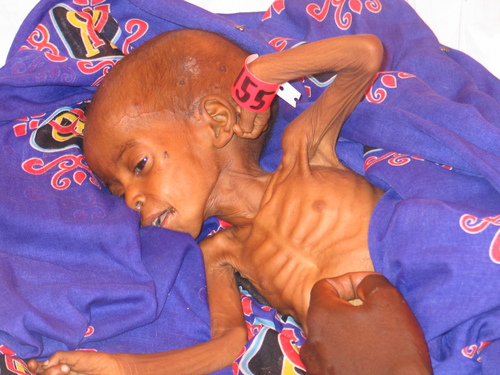
You Who Read No Calm
by T. Merrill
You, who read no calm reportings
Of alien, distant, dire events,
But shriek and keen as loves go down
Beyond all help, to violence;
Whose temple's walls, stormstruck and split
By sizzling bolts collapse around,
While mid the crash of chaos hope
Whirls in a death-spin to the ground;
You, who alone in deep distress
Cry out for help where there is none,
All you whom I shall never know:
I know a portion nonetheless
Of cruel trials you undergo.
Killers in many guises come:
Sudden as electric shock
Or looming ghostly as a shark
Leisurely finning toward its mark.
I who breathless and sweating once
Wrestled a devil to the floor,
And saw him rise again when he
Finished what he began before,
I who re-learned each childhood prayer
Forgotten, to the stars once more
Send up a poor and hopeless plea
For spirit's peace beyond despair.
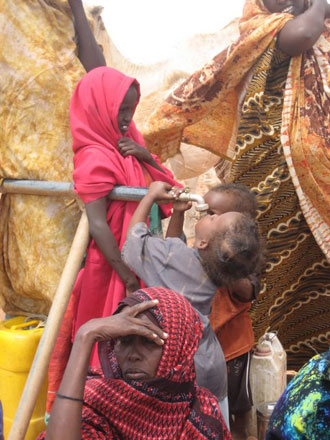
Tears of Darfur
by Mahnaz Badihian
O tired land
O depressed sky of Darfur
O plain of no breath
You are bleeding from all corners
Of your dreams
The bosom of your land
Weeps the bitterness of blood
O tearful Darfur,
Can your hungry hands
One day cultivate those
Dry, sad roots, left from
The countless bones
Of your children
Can your simple dreams
Of having a
Loaf of bread and a roof above
Come through?
Maybe,
Maybe one day
Those broken wings
Will heal
With the caressing hands
Of peace
We the people of the world
With our tearful eyes
Waiting on the day that
Acacias will bloom
On the lands where
The dream of innocence pours
On these hopeless days
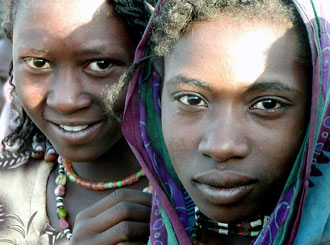
War Metaphysics for a Sudanese Girl
Adrie Kusserow
I leave the camp, unable to breathe,
me Freud girl, after her interior,
she Lost Girl, after my purse,
her face:
dark as eggplant,
her gaze:
unpinnable, untraceable,
floating, open, defying the gravity
I was told keeps pain in place.
Maybe trauma doesn't harden,
packed, tight as sediment at the bottom of her psyche,
dry and cracked as the desert she crossed,
maybe memory doesn't stalk her
with its bulging eyes.
Once inside the body
does war move up or down,
maybe the body pisses it out,
maybe it dissipates, like sweat and fog
under the heat of a colonial God,
and in America, maybe it flavors dull muzungu lives,
each refugee a bouillon cube of horror.
Maybe war can't be soaked up
by humans alone,
the way the rains in Sudan
move across the land,
drenching the ground, animals, camps, sky,
no end to its roaming
until further out, among the planets,
a stubborn galaxy finally mops it up,
and it sits, hushed,
red, sober,
and below, the humans in the north
with their penchant for denial,
naming it aurora borealis.
*Muzungu means "white person" in many Bantu languages of east, central and
South Africa
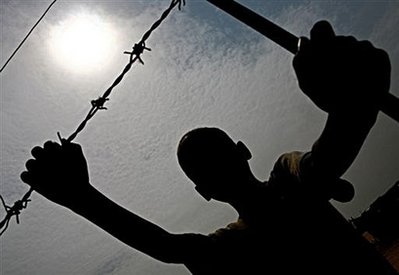
Milk
Adrie Kusserow
Sudanese Refugee Camp, Northwest Uganda
I.
Our drivers gun insanely over the dusty, red roads,
lurching from pothole to pothole.
Caravan of slick, adrenalized vans,
tattooed with symbols of western aid,
Will on my lap, trying to nurse between bumps,
my hands a helmet to his bobbing skull.
A three-legged goat hobbles to the side
and though we imagine we are a huge interruption,
women balancing jeri cans on their heads, face our wake
of dust and rage as they would any other gust of wind—
Water, sun, NGO.
We arrive covered in orange dust, coughing,
fleet of SUVs parked under the trees,
engines cooling, Star Trekkian cockpits flashing,
alarms beeping and squawking as we zip-lock them up
and leave them black-windowed, self-contained as UFO's.
Behind the gate, we stumble through the boiling, shoulder deep sun,
Will and I trying to play soccer
as a trickle of Sudanese kids cross the road
hanging against the fence, watching the chubby Muzungu boy
I've toted around Africa like a pot of gold.
Three years old, he knows they're watching, so he does a little
dance,
his SpiderMan shoes lighting up as he kicks the ball.
II.
Part African bush, part Wild West,
we're based in Arua, grungy, dusty frontiertown,
giant dieseled trucks barrel through, spreading their wake of
adrenalin,
obese sacks of grain lying like walrus inside.
I chase Will from malarial puddle to puddle,
white blouse frilled like a gaudy gladiola,
lavish concern for my chubby son
suddenly rococo, absurd.
III.
7 foot giants of the SPLA, huddle together, drinking,
talking Dinka politics, repatriation, the New Sudan,
wives lanky as giraffes, set food on the table and disappear.
In candlelight the men's forehead scars gleam—
I flutter around them acting more deferential than I'm used to,
slowly I'm learning Sudanese grammar—
men, verbs, women, the conjunctions that link them together.
In the thick of rain we walk home,
Ugandans huddled under their makeshift bird cages,
Will now pointing to the basic vocabulary of this road—
dead snake, prickly bush, squealing pig, peeing child.
Three drunk men huddled at a shack
scrape the whiteness off us as we walk by.
Though I don't want to hear it,
though I love Africa,
it starts up anyway, the milky mother cells of my body high-fiving,
my mind quietly repeating the story of my son's lucky birth,
his rich American inheritance.
IV.
My husband drops into bed, dragging a thick cloak of requests.
All day, I've labored behind him, toting our clueless muzungu,
watching him, dogged Dutchman in his rubber clogs
climbing the soggy hills of Kampala, despite the noonday heat,
a posse of hopeful Lost Boys following him.
He, afraid of nothing, really; not even death,
me afraid of everything really, most of all his death.
In the distance, trucks rev up to cross the bush
where Sudanese families perched like kites caught in trees,
wait for the next shipment.
But it's night now,
the three of us inside the cloud chamber of our mosquito net,
the two of them breathing, safe.
Will's nursing again, though he doesn't need to,
swelling like a tick
and though I don't want to love
the sweet mists of our tiny tent home,
the lush wetlands of our lives,
its thick rope bridges and gentle Ugandan hills,
the fat claw of my heart rises up,
fertile, lucky, random
pulsing its victory song.
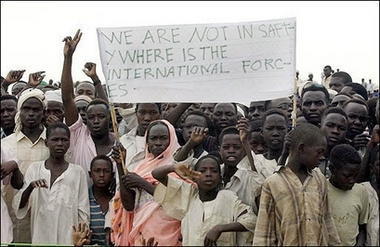
Mud
Adrie Kusserow
I.
The pond black and bulging,
ice storm ruins poking from the water
like the stiff feet of, dare I say, fallen soldiers.
Robert still in Sudan,
back in Vermont, the kids and I limp through two weeks of cold rain,
I drape Ana and Will in rain gear
watch the drunken tents run across the field.
Ana plunks her chubby toes into a fleet of tadpoles
cold mud sucking her foot into its mouth.
I drag the branches onto shore,
globs of frog eggs surface like transparent brains,
Ana cupping the dimpled jelly,
the dogs licking it like caviar.
Entranced, she squeezes it
until I tell her to stop
before she crushes the eggs.
I tell myself it's not quite violence but over eager love,
this lust with which they squeeze the living,
smearing the mud onto their own limbs.
But what of this blur
between awe and destruction,
love and violence?
At night, the peepers,
screaming themselves into existence.
Two frogs griplocked onto a female,
her flesh bulging between their swollen fingers.
"They're wrestling," I say, not wanting to reveal the darker side of their
mating.
I gingerly pry the males off, Will cheering,
Ana serious and methodic
until she finally dislodges the last one's grip with her twig
and they fall apart wriggling in the grass.
II.
The rains just started in Juba, south Sudan,
making travel, and maybe war, near impossible.
Still my husband pushes a saggy jeep for eight hours
through four feet of mud, a Sudanese boy
lying unconscious in the back seat.
The jeep rocking and lurching
on the only road cleared of mines
as my husband tries to inch it forward, this, his own labor of love,
like birth, like sex, something always tears,
his foot jammed with a thorn as he heaves and sinks
his toenail tearing off, until even he gives up
and forces them to turn back,
still 40 miles from Aliab, the whole village waiting for them,
caught in an outbreak of cholera,
its one river littered with rusty ammunition,
trucks large as elephants lying on their sides.
When Abraham, their Lost Boy,* came home after 18 years,
the elders sacrificed a white cow.
Jump over it, into peace, they cried
while the women tipped their thin necks back,
their whips of ululation uncoiling in the heat.
III.
The frogs, still wiggling on the grass,
Ana clutches the tan-pink female,
despite its eerie mask, she wants to take it home.
I tell her just one night,
then we'll let it go back to its real home—
but the next morning it's done the impossible,
jumped out of its three foot fortress.
I roam the rooms crazed, desperate to find it.
I do,
a day later, shrunken in the comer of the bathroom
but still breathing. I race it to the pond,
children confused behind me,
watch it sink, stunned, then lethargically swim away,
still dried and wrinkled, despite its immersion in water,
like Abraham, now more American than Sudanese,
sitting wide-eyed and stiff amidst the wailing and singing.
IV.
Robert home, worn out, but safe.
I take a walk to the pond and find—
a tan-pink frog, perhaps the same one,
floating in the water,
I can't tell if it's alive or dead.
I know how I came to be married to this man,
I followed him from country to country,
gripped him hard as the frogs—
Still he did not peel me off, as I have tried to do
with his over eager love, for this gangly, barren country of Sudan.
Who knows what will be torn next,
it's just what happens when you love the world
and you move blindly, but well intentioned,
amidst the irresistible mud.
*The "Lost Boys" refers to the 17,000 children in southern Sudan
who fled
their homes in 1987 seeking refuge from the civil war. They walked 1,000 miles
before they finally found protection in a Kenyan refugee camp, Kaukuma. By the
time they arrived there, half of the boys had died from starvation, thirst,
soldiers, lions and bandits. About 3,700 have recently been resettled in
America.
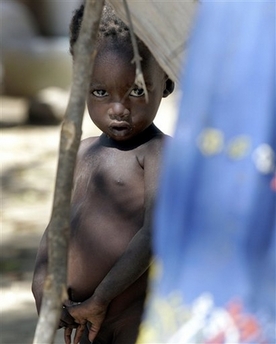
News From Darfur
by Joseph McDonough
so much depends
upon
a red cross
truck
glistening with sun
shine
beside the white
man
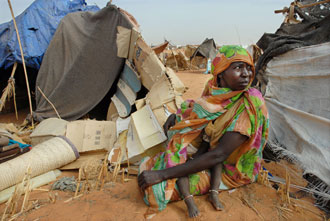
Darfur
by Michael R. Burch
Darfur,
I admit that my heart recoils
from the thought of your agony
as the hammering machine guns
yammer at your ebony
breast.
Darfur,
I am not equal to the task
of your impassioned soliloquy.
Darfur, I am pressed
hard to understand
why men molest
innocence
so violently.
Darfur, I confess—
I have watched you dying
silently.
Darfur, I would bless
you,
if only I knew
how.
Darfur,
I stand helpless,
naked before your indignation
now.
Darfur,
I have only my pen.
Let me wield it like a rapier,
set fire to this paper,
till the world in burning shreds
collapses on our heads
and we see your fate is ours
if we cannot change the course
of this world intent to maim
each man who’s not the "same"
in color and in creed.
And yet the blood you bleed,
as red as mine, demands
that we die holding hands.
O Darfur,
I’ll bleed too
when the ravenous jackals
are through
with you.
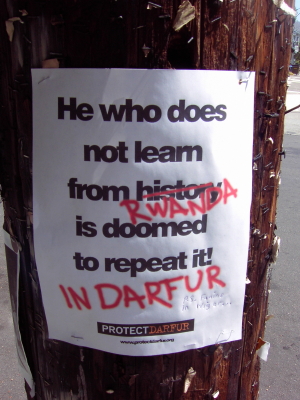
Who knows one?
by
Rabbi Michael Strassfeld
a Passover reflection, April 2006
Who knows one? One is the
Janjaweed militia cleansing Darfur
Who knows one? Two is the
stealing and killing of livestock
Who knows one? Three is the
poisoning of wells and the destruction of crops
Who knows one? Four is the
use of rape to destroy and humiliate families
Who knows one? Five is the
creation of two-and-a-half million people: displaced, hungry, susceptible to
disease
Who knows one? Six is the
over four hundred thousand people who have already died.
These and more are the
plagues of Darfur.
Who knows one?
I know one.
Send a postcard to President
Bush. Urge him to take leadership on this issue.
lo dayenu — but it is not
enough.
Who knows one?
I know one.
Encourage institutions to
hang Save Darfur banners outside their buildings.
lo dayenu — but it is not
enough.
Who knows one?
I know one.
Attend the rally in
Washington, DC on April 30th.
lo dayenu — but it is not
enough.
Who knows one?
I know one — Rwanda
Who knows one?
I know one — Bosnia
Who knows one?
I know one — Cambodia
There are too many ones.
And I am the child who does
not know how to count:
One. Two. Four hundred
thousand. Six million.
For six million are the lips
of our dead mouthing “never again” in eternal silence.
Who knows one? I know one.
For I am that one.
One person created in the
image of God.
It is for me alone to speak
out. I and no other.
Not a messenger, not a
congressperson, not a president.
I alone am here to tell the
tale.
Who knows one? I am that one.
And who knows — I may be the
one who will make the difference.
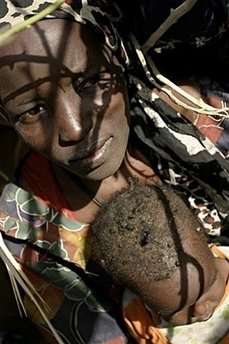
Displaced Persons Camp in Darfur
by
Yala
Korwin
Please follow me and watch that woman bent,
as willows bend, face hidden in her hand.
A picture of despair, to say the least.
That other one is hiding in her tent.
She was tortured and raped, here on the sand.
The Devil on Horseback did it. A beast.
For her it was a shame. For him
—a feast.
Now she’s ostracized. Custom of this land.
These orphaned children sit. They never play.
They seem to be so scared. They sit and they
just stare at nothing. They look so spent …
Their future? Who knows? Let’s hope
— not all gray
This boy is maimed. His sister’s womb is rent.
The men do battle. They kill. The children pay.
What for Darfur
by Ed Miller
There is no oil beneath the ground
Or wealth above the ground to seize
Just villages of African poor
I ask "What for Darfur?"
The hot sun rots the severed heads
Left by these murderous hordes
Widows, orphans, and more
I ask, "What for Darfur?"
We stopped it in Bosnia, was white
Not Ruwanda, that wasn't right
Haven't learned from Holocaust lore
I ask, "What for Darfur?"
UN pretends to care, without arms to fight
Reports of massacres, camps daily blight
What will finally stop this war
I ask, "What for Darfur?"
An army of righteous, army with might
Disarm the Jonjuive enemy, day and night
Return the people to peace as before
I ask again, "What for Darfur?"
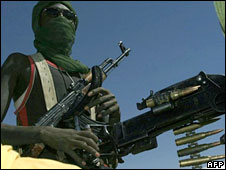
On the Propensity of the Human Species to Repeat Error
by Christina Pacosz
"And if they
kill others for being who they are
or where they are
Is this a law of history
or simply, what must change?"
—Adrienne
Rich
The world is round.
This should tell us
something, this should
have been our first clue
what goes around
comes around
Scientists are studying
a rent in the roof of sky
over the South Pole
right now but poets
need not adhere
to the caution
of the scientific method.
The message is simple:
what goes around
comes around
The battery acid of
Plato's Republic
has finally reached
the ozone layer,
a membrane, protective
like skin or an amniotic sac,
permeable and destructible
what we take
for granted
will get us
in the end
The Sioux woman's breast
severed from her body
dried into a pouch
for tobacco,
what book was that?
Or a chosen people's skin
stretched across the heavens,
shade for us to more easily
read the harsh lesson
of history.
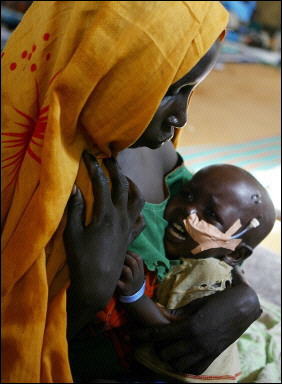
I am a woman
by Sheema
Kalbasi with Roger Humes
I am woman
coming from the desert
coming from the long line of tribes
coming from the long line of faiths
They called me mad
They chained me to the wall naked
yet I broke free the bonds
and ran through the pain of my existence
in search of the innocence that was denied me
and they called me mad
and they called me the evil spawn of Satan
yet I broke free the bonds
and ran towards our freedom
where I knelt
before the Mother and the Son
and I called them Salvation
and they named me Nation
and I tore loose the chains of captivity
only to fall once more into bondage
when I was raped by a Mongol
married a Jew
gave birth to a Muslim
watched the child convert to Buddhism
watched the child marry a Bahai
live as a Christian
die as a Hindu
I am a woman
I am the river
I am the sky
I am the clouded covered trees upon the mountain
I am the fertile earth whose song the plants drink deep
I am the long line of tribes
I am the long line of faiths
Don't try to convert me
into something I am not
for I am already all
that humanity will ever be
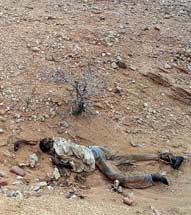
The Blade of Grass in a Dreamless Field
by
Takashi "Thomas" Tanemori
Only a few knew it existed;
No one knew its power;
The world would never be the same again,
Changing irrevocably and forever.
The six-hundred-year history of Hiroshima
Disappeared in the ashes,
On this Judgment Day, on this Morning!
(i)
Blameless souls forever vanish
on this morning, this judgment day.
Our silent cries, to heaven we appeal,
scattered like the ash of withered leaves.
Our ebbing souls
cling to that lonely sky;
we try in vain to escape this sea of flame.
Oh, Hiroshima, once my haven,
why has your life been sacrificed?
(ii)
The abounding sadness within my heart . . .
drowning my loneliness in tears of self-pity.
Four abandoned children;
wishing to feel our mother's love,
just once more;
if only in our dreams.
The heat of yet another long night lingers.
Oh, Hiroshima, once my home,
my tears run dry waiting for the breaking dawn.
(iii)
My soul is torn by this rage inside,
an orphan of war;
why does this make me feel guilty?
Why do my neighbors turn away
or, close their ears when I speak?
Bitterness poisons this innocent child,
I madly waste away.
Oh, Hiroshima, once my cradle,
I am waiting to die.
(iv)
Gathering remnants of my courage,
I stand alone in this notorious America, land of the enemy.
An outcast with slanted eyes,
I fall before the indifference of strangers;
sightlessly, they trample upon my dignity.
This life of anguish seems to be my destiny.
Praying for death, I endure time.
Oh, Hiroshima, once my comfort,
I am lost in dreams of revenge.
(v)
Budding leaves renew this tired place, this tired soul;
gently the rain is embraced by your love,
comforting this savaged heart.
A blade of grass emerges from the ashes,
and my heart becomes a light,
connecting me to heaven.
Living for one another, this is my path!
Oh Hiroshima, forever my love,
may my life become a bridge from you and others.
(vi)
At the dawn of the 21st century,
we honor this passage through darkness.
We must have the courage to enter
the void again . . . and again,
emerging with the gift of new life.
Healing only comes through learning to forgive
and making peace with our past.
Only then, will the wind whisper:
"Hibakusha, you have not lived in vain!"
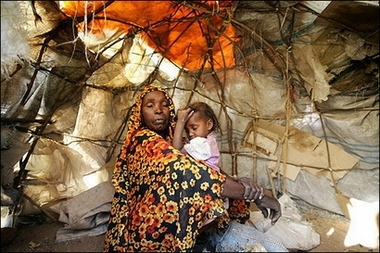
Crisis (Darfur)
by lungelo mbatha
Won’t you help to sing the song of Bob Marley
If ‘tis all we seem to have!
For how long shall they kill our PEOPLE
Genocide after genocide
Whilst everybody stands and looks …
When shall the Children taste the fruit
From the freedom tree watered at its root
By the blood of our people before us
Oh! What a shame on the ‘body of nations’!
Jumping from left to right, round and round
Wasting time, when ever The Burnt Faces are at the receiving end!
Let that old black fist of AMANDLA rise up high
Now open to make it STOP, to make it STOP!
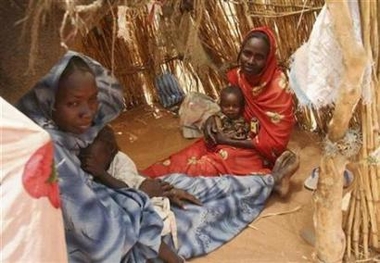
A Child of the Millennium
by Charles Adés
Fishman
He’s five months old now — a little short
on experience — but if he could speak,
Jake would sit with the Dalai Lama on a red
and golden throne and hold forth on happiness
and compassion on freeing the mind from vengeance
and regret and living in exile from the sacred home:
he’s seen the end of days . . . and the beginning.
He doesn’t know about race or gender
or that we are murdering the planet that the earth
is smoldering with underground fires and with the bone-
fires of hatred He doesn’t know about ethnicity
or religion and will not take with him into the new century
memories of calcined corpses or an interior landscape
peopled with napalmed children.
What Jake is best at has nothing to do with genocide
or the acid tides of history He travels in realms
where tenderness is a face that brushes his face
He feels the strength of those around him and their love
and time ticks at his wrist like the gentlest rain His eyes
are the most translucent lakes, his smiles tiny suns
that shine a clear light on the living.
Children of The Holocaust
by Joseph McDonough
The perfectly white
cat
sits upon
the lush green lawn
they run they run
through fields
of sun
calling calling its name
Ashes Ashes
falling
like rain
Poets Against the Genocide in Dafur
by
Gordon Ramel
Nobody knows how many people have died during
the two-year conflict in Sudan's western Darfur region.
US academic Eric Reeves estimated the death toll at
340,000 at the beginning of 2005. But so far the crisis
shows no signs of abating.
If a poet’s true vocation is to speak
with words so well perfected they remain
as thoughts forever in the hearer’s brain,
then poets are the people we must seek.
To spin bright webs that will ignite the minds
and wake the sleeping masses of this world,
‘til they become a tidal wave that’s hurled
against the cruel indifference that blinds
the tame and tepid leaders of our time.
The systematic slaughter in Dafur,
this gory, gruesome, genocidal war,
is now our world’s most sick and senseless crime;
and I for one would like my government
to make its end their primary intent.
Black Climate of Change
by Zyskandar Jaimot
gone into giant swirling whirlwinds of khamseens
gone into vicious sprawling outbursts of tribal revenge
mothers, babes all bundled together in refuge
mothers calling, praying to strange foreign deities for succor
their voices unheeded in all the world
their DNA gone – vanished amid waves of bloody sand
never replaced – never thought of – never considered
their DNA unimportant
their DNA inconsequential
their essence gone
Related pages:
Parkland Poems,
Sandy Hook Poems,
Columbine Poems,
Darfur
Poems,
Gaza
Poems,
Haiti Poems, Hiroshima
Poems, Holocaust Poems,
Nakba Poems,
911 Poems,
Trail
of Tears
The HyperTexts









